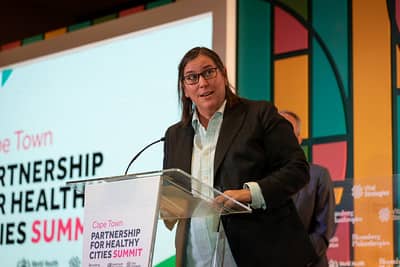By Linda Naa Deide Aryeetey
Cape Town, March 8, GNA – The Partnership for Healthy Cities (PHC) Summit 2024 is being held in Cape Town to foster synergies and share best practices to fight Non-Communicable Diseases (NCDs) and injuries in cities around the world.
The Summit, hosted by Bloomberg Philanthropies, World Health Organization (WHO), Vital Strategies, and the City of Cape Town, assembled public health leaders from more than 50 cities across the globe to discuss how to strengthen response to NCDs and injuries.
Within the two-day summit, technical and communication leads from urban centres exchanged ideas and experiences on how cities can prevent NCDs like cardiovascular disease, strokes, hypertension, cancers, diabetes, chronic respiratory diseases for healthier and safer lives.

Ms Kelly Larson, the Injury Prevention Lead, Bloomberg Philanthropies, said the PHC programme was one sure way for cities to receive support for their efforts to reduce NCDs and injuries to improve longevity for a great number of people.
“The Partnership for Healthy Cities is an opportunity to have cities take the lead in addressing injuries and NCDs and we are very excited to support cities as they lead the way and take the initiatives,” she said.
She said the burden of NCDs and injuries on global development was immense, accounting for roughly 86 per cent of deaths in low and middle-income countries, while unintentional injuries took the lives of over 3 million people every year.
Ariella Rojhani, Director of Partnership for Healthy Cities at Vital Strategies, said NCDs were global public health crisis that could be solved by reaching the large number of people with interventions at where they lived.
She said the PHC existed to close the gap between the policies that national government put forward, the implementation process and articulate them in a way that was meaningful to people in the cities.
“The Summit presents an opportunity for City governments to inspire one another and take-home great ideas and implement them and as implementing partners, we seek to make the programme sell around the world,” she said.
The Director of the Department of Social Determinants of Health at the WHO, Dr Etienne Krug, said people in cities were exposed to risks like air pollution, unhealth food and drinks and traffic dangers, but the biggest challenge was Non-Communicable Disease, which contributed to 80 per cent of preventable deaths in the world.

Dr Krug said WHO was building up urban health programmes as it recognised the importance of working in cities, noting that the PHC was a practical implementation arm on policies and the technical works of the WHO and created a platform for counties to share best practices.
Cape Town’s Mayor, Mr. Geordin Hill-Lewis, said NCD and injuries could be reduced by understanding the exact factors that contributed to the burden and that the PHC programme allowed the cities to identify challenges and focus on solutions.
He said creating a more equitable society for better health outcomes was a challenge taken seriously in the city of Cape Town which had a quadruple burden of NCDs, Maternal and Child Healthcare issues and injuries.
He stated that cities had a crucial role to play in building resilient communities to better public health policies.
“Over 300 million people around the world are represented by the 73 cities that make up this partnership, I am sure that whatever public health challenges we face here in Cape Town, is not new to many of you, many of you overcome some of them and each of your successes bring us close to success,” he said.
The Partnership for Healthy Cities established in 2017 brings together 73 cities that have agreed to implement at least one of the 14 proven polices to fight NCDs and injuries.
The policies encourage countries to create a smoke-free city, ban tobacco advertising, raise tobacco taxes and levies, tax sugary drinks, set nutrition standards for foods served and sold in public institutions and regulate food and drink marketing,
The Partnership, also as part of the policy, injects resources in the cities it partners to adopt, implement, and enforce food-service policies, reduce speeding and increase motorcycle helmet use, reduce drinking and driving, increase seat belt use, promote active mobility and prevent opioid-associated overdose deaths.
GNA